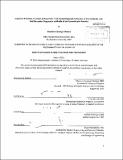Economic potential of a point-of-care CD4+ T cell count diagnostic in Mexico : a case study for low-end disruption diagnostics in middle of the pyramid Latin America
Author(s)
Camargo Támara, Mauricio
DownloadFull printable version (11.73Mb)
Alternative title
Economic potential of a point-of-care CD4 count diagnostic in Mexico : a case study for low-end disruption diagnostics in middle of the pyramid Latin America
Other Contributors
Harvard--MIT Program in Health Sciences and Technology.
Advisor
Ernst Berndt and William Rodriguez.
Terms of use
Metadata
Show full item recordAbstract
Disruptive models of innovation are starting to appear in healthcare. In the US, for instance, retail medicine clinics are changing the way in which patients satisfy their basic medical needs. In Mexico, similar retail medicine models (e.g. Farmacias Similares) are also disrupting healthcare delivery for basic medical needs. Disruptive innovations, however, are not limited to healthcare delivery, but also change the face of devices and diagnostics markets. A low CD4+ T cell count is the primary clinical indicator for HIV/AIDS disease progression, and thus is used as the primary trigger to initiate antiretroviral therapy. An entire diagnostic industry has emerged around CD4+ T cell counts for the management and treatment of HIV/AIDS patients. The diagnostic gold standards of CD4+ counts are flow cytometers. These large, capital intensive devices are commonly located in central laboratory settings, typically in urban areas. In developing nations, particularly, suburban and rural regions have no access to flow cytometers and typically face logistical problems of blood sample transportation and loss to follow-up of patients. Point-of-Care (POC) diagnostics promise disruptive models in diagnostics that will increase access, enhance care, and help better allocate healthcare resources. The concept of POC embodies the trade-off of lower "quality" (usually in the form of lower specificity and sensitivity) in exchange for higher "convenience" (i.e. better accessibility and portability, and significantly lower cost). POC diagnostics promise typical low-end and new-market disruptions in medical diagnostics and devices. Cambridge-based Daktari Diagnostics is one of such companies focused in POC diagnostics. It has developed a CD4+ T cell count diagnostic device for the management and treatment of HIV/AIDS patients. It is hypothesized in this thesis that there exists a relevant unmet medical need for POC CD4 count diagnostics in the Mexican HIV/AIDS market. In order to evaluate this hypothesis, secondary sources were reviewed, as well as primary interviews conducted across the Mexican HIV/AIDS healthcare landscape. While this hypothesis was evaluated on a preliminary basis only, responses suggested a relevant, albeit not urgent, medical need for POC CD4 count diagnostics. This primary hypothesis evaluation is extended by and complemented with market size estimations, and competitive dynamic discussions, that arrive at the following preliminary conclusions: the current market opportunity in Mexico ranges from baseline of ~100,000 tests per year to an upper bound potential of ~200,000 tests per year. In the context of this potential opportunity, Daktari's CD4 count diagnostic device is well positioned, as defined by diagnostic quality, technological characteristics, and competitive offering, to obtain a portion of this estimated market opportunity in Mexico.
Description
Thesis (S.M. in Health Sciences and Technology)--Harvard-MIT Program in Health Sciences and Technology, 2012. Cataloged from PDF version of thesis. Includes bibliographical references (p. 92-95).
Date issued
2012Department
Harvard University--MIT Division of Health Sciences and TechnologyPublisher
Massachusetts Institute of Technology
Keywords
Harvard--MIT Program in Health Sciences and Technology.